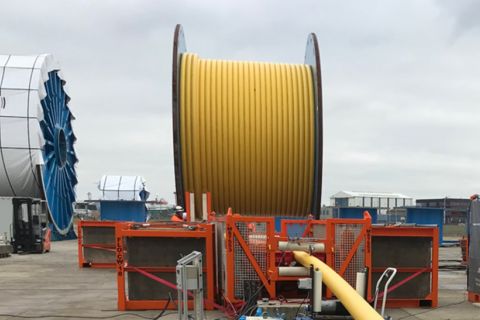
Oregon’s Oregon Department of Environmental Quality denied a Jordan Cove LNG pipeline application for a Section 401 Water Quality Certification on May 6. The certification is required for the U.S. Army Corps of Engineers to issue permits for the project.
The proposed project by Canadian company Pembina calls for a liquefied natural gas export facility in Coos Bay and would include a 229-mile, 36-in. pipeline from Malin in Klamath County to the facility in Coos Bay.
DEQ said in a press release it is denying the certification at this time “because there is insufficient information to demonstrate compliance with water quality standards, and because the available information shows that some standards are more likely than not to be violated.”
The agency went on to say, “Through further analysis, and possibly through project changes and mitigation, the applicant may be able to show the standards for certification will be met, but the current record does not allow DEQ to reach that conclusion today.”
DEQ’s action is being made “without prejudice.” This means that Pembina may reapply for the certification, and submit additional information that could result in a different decision
“If Jordan Cove resubmits an application along with information addressing DEQ’s concerns, DEQ will work to keep the timing of its review in line with the overall federal schedule for the project,” DEQ said in a statement.
DEQ spokesperson Katherine Benenati said DEQ requested additional information from Jordan Cove last September, December and March.
“Jordan Cove has responded to some of those information requests, but not all of them,” she said, according to the website for Oregon Public Broadcasting (OPB.)
DEQ listed its specific concerns, among others, as:
- Expected effects of the construction and operation of the proposed pipeline and associated road and work areas on water temperature and sediment in streams and wetlands, and;
- The risk of release of drilling materials from the construction of the proposed crossing of the Coos Bay estuary.
Regulators said the pipeline, which has 300 water crossings planned, threatens to increase water temperatures and put more sediment in streams and wetlands.
OPB reported that Pembina said it was working to understand the decision and its impacts. Jordan Cove still will have the option to reapply for the certification, providing further information that could result in approval being granted.
On its website, Pembina states, “The Jordan Cove Project will build a safe, clean, reliable natural gas pipeline and a liquefied natural gas (LNG) export terminal in Coos County, Oregon. The Jordan Cove Project will create more than 6,000 good-paying construction jobs at peak and an estimated 8,500 spin-off jobs in hospitality, retail, tourism, and healthcare.”
Recommended Reading
Iraq to Seek Bids for Oil, Gas Contracts April 27
2024-04-18 - Iraq will auction 30 new oil and gas projects in two licensing rounds distributed across the country.
Vår Energi Hits Oil with Ringhorne North
2024-04-17 - Vår Energi’s North Sea discovery de-risks drilling prospects in the area and could be tied back to Balder area infrastructure.
Tethys Oil Releases March Production Results
2024-04-17 - Tethys Oil said the official selling price of its Oman Export Blend oil was $78.75/bbl.
Exxon Mobil Guyana Awards Two Contracts for its Whiptail Project
2024-04-16 - Exxon Mobil Guyana awarded Strohm and TechnipFMC with contracts for its Whiptail Project located offshore in Guyana’s Stabroek Block.
Deepwater Roundup 2024: Offshore Europe, Middle East
2024-04-16 - Part three of Hart Energy’s 2024 Deepwater Roundup takes a look at Europe and the Middle East. Aphrodite, Cyprus’ first offshore project looks to come online in 2027 and Phase 2 of TPAO-operated Sakarya Field looks to come onstream the following year.




